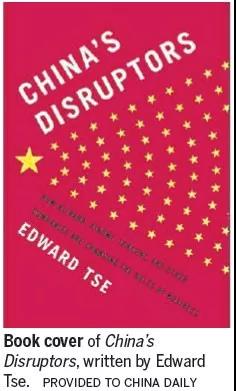
By Edward Tse | China Daily Africa | Updated: 2017-12-08
AI, internet of things to change the way companies acquire, connect, communicate, interact and service customers
The fourth World Internet Conference, which just concluded in Wuzhen, Zhejiang province, attracted a large number of senior participants – ranging from government officials and multinationals to leading tech companies and academics – under the theme of “Developing Digital Economy for Openness and Shared Benefits – Building a Community of Common Future in Cyberspace”.
Top foreign tech company executives, including Apple CEO Tim Cook and Google CEO Sundar Pichai, along with the leaders of China’s internet giants – Jack Ma (Alibaba), Pony Ma (Tencent) and Robin Li (Baidu) – attended the conference.
For a long time, China has been viewed as a nation reliant on low manufacturing costs and products and services copied from the West. Very few people believed that China had the ability for innovation. However, its development has proved otherwise.
Since the beginning of this decade, innovation and entrepreneurship have become key drivers for China’s economic development. An increasing number of young Chinese entrepreneurs and their fearless experimentations in new technologies have emerged. And, to the surprise of many, some Chinese entrepreneurial companies, notably Tencent and Alibaba, are now in the league of the world’s most valuable companies.
So what drives innovation and entrepreneurship in China? I think it is the following seven key factors:
Why not me? The question of “why not me?” is a key engine that drives the Chinese entrepreneurial spirit. Young Chinese entrepreneurs, post-’80s and post-’90s, believe that if Jack Ma and Pony Ma can become men with great wealth, why not me? They are inspired by these legendary success stories, spawning a desire to strive for their own success. Armed with a fearless attitude toward failure, they are often very agile and responsive to market shifts.
Market opportunities provided by the State-dominated economy: State-owned enterprises have important roles to play in the Chinese economy, but they are usually big and slow to react in a fast-changing market that is marked by intense competition. This created immense opportunities for innovative private companies able to take advantage of this market gap.
Transformative and intense competition: It has taken several decades for China to gradually transform from a planned economy to a market economy, and will likely take another couple of decades more, if ever, for a complete transition. A number of sectors opened up during the transformation, attracting numerous players and igniting intense competition. Against this background, innovation is the best way for companies to enhance their competitiveness and to stay ahead of competition.
Chinese society’s pain points: During the transformation process, Chinese society’s pain points, which had been hidden from sight before, became readily visible. Entrepreneurs considered these pain points as golden opportunities for innovation. Many innovations came about for the sake of solving societal ills or easing the pressure created by societal pain points.
Prevalence of technology, especially wireless internet: Technology is definitely a major enabler for innovation. Smart devices debuted a decade ago and are now becoming a core part of Chinese’ consumers daily connected lifestyle. Wireless Internet, 5G network and artificial intelligence all provide tremendous disruption opportunities for innovators and entrepreneurs.

The massive scale of the Chinese market: The size and fast-changing nature of China’s market allow companies to rapidly scale up. At the same time, there is plenty of room for innovators and entrepreneurs to learn via trial and error. Leading Chinese companies are also benefiting from high valuations that are based on favorable forward-looking expectations of China’s market potential. This gives them the needed capital ammunition to support their growth.
Capital resources: The availability of venture capital and angel funds, both overseas and local, is another key driver of innovations in China. Chinese companies have greatly benefited from the vast sums of capital provided by both foreign and homegrown investors over time.
In a congratulatory letter to the this year’s conference, President Xi Jinping said deep integration is needed between new technologies, such as the internet, AI, big data and the real economy, in a bid to fuel growth of the digital economy and sharing economy in China.
Using AI as an example, China’s unique capacity among nations to combine strong top-down government directive (both at central and local government levels) with vibrant grassroots-level innovation and an entrepreneurial ecosystem bodes well for success in its AI development. China has positioned AI as a national strategic priority, aiming to gain first-mover advantage in the revolutionary AI technology to leapfrog foreign peers and to become a world leader in science and technology development. The State Council, China’s Cabinet, released a “New Generation AI Development Plan”, which declared the goal for China to become a global leading AI innovation hub with an industrial scale of over 1 trillion yuan ($151 billion; 127.7 billion euros; £112.6 billion) by 2030.
Not only is the central government very supportive of AI innovation; local governments in China are also devoting resources and investing heavily into AI technology innovation in a bid to gain regional competitive advantage. For example, Guizhou, one of poorest provinces in China, positions itself, with support from the central government, as China’s “Big Data Hub” and has attracted major companies, such as Apple, Alibaba, Tencent and Qualcomm, to set up new data centers. Guizhou was able to achieve 10.5 percent growth in GDP, which was the second-highest in China.
Local governments also have a “coopetition” mindset, willing to collaborate with cities in a cluster and region and grow together. For example, cities within the Guangdong-Hong Kong-Macao Greater Bay Area, such as Dongguan, Guangzhou and Shenzhen, have all been competing with each other for a long time, but they will also collaborate to incorporate AI into their development plans and leverage it as a key economic growth engine for the Greater Bay Area cluster.
The government’s favorable policies have further promoted innovations across a wide range of tech players. Leading internet giants such as Baidu, Alibaba and Tencent, rising startups like Face++ (cognitive services), iCarbonX (healthcare), Mobvoi (natural language processing) and SenseTime (computer vision), as well as unicorns like Didi Chuxing and Xiaomi, are either already adopting AI technology in their operations or investing in it.
Another key technology area in this year’s conference was the internet of things, a network connecting physical devices, such as vehicles and home appliances, and data. This technology can help to digitize a user’s offline activities, connect the isolated information and data together and generate insights from the big data.
Looking ahead, new technologies such as AI and IoT will fundamentally change the way companies acquire, connect, communicate, interact and service their customers. In the future, industry boundaries will become blurred, and the new technologies can help companies to build customer-centric organizations with ubiquity, segment of one, connectivity and interactivity. Tencent CEO Pony Ma gave a speech in which he said that, in the past, wireless internet solved the pain points of individual users, while in the future, internet companies with new technologies will enable different industries and solve their pain points.
There will be many challenges waiting for China along the way to reach its goal of taking a global leading position on AI or IoT. However, like anything related to technological innovation these days, it would be imprudent to rule China out.
The author is founder and CEO of Gao Feng Advisory, a global strategy and management consulting company with roots in China. He is also author of China’s Disruptors.

